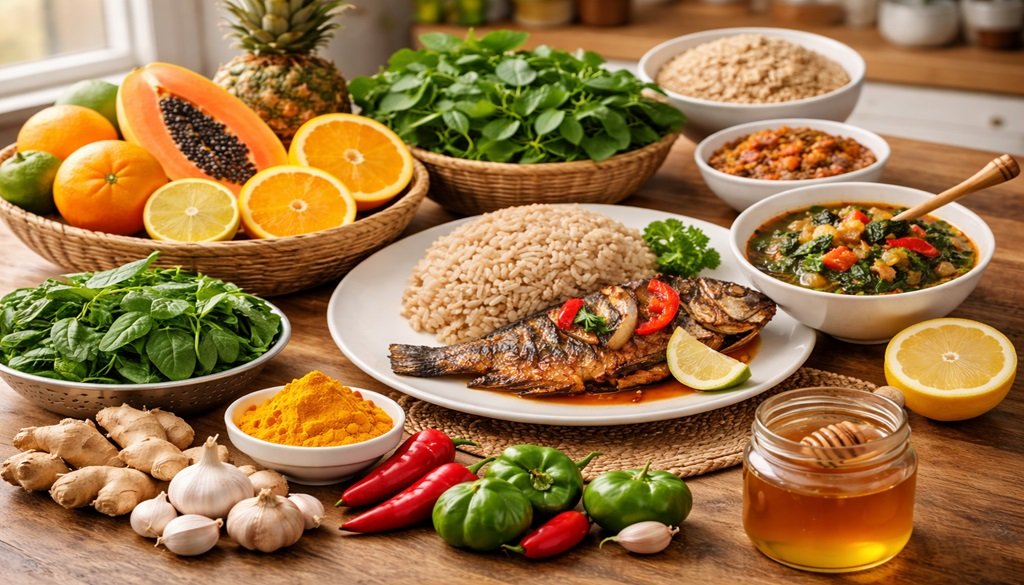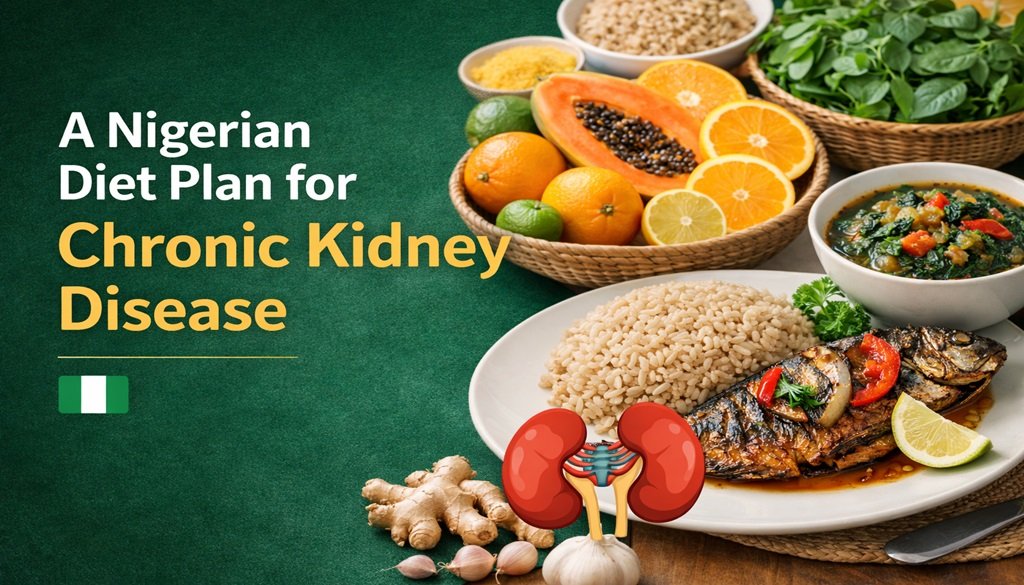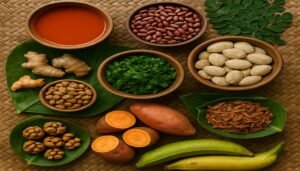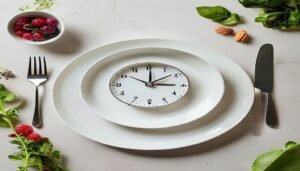Mr. Kora, a 56-year-old businessman, came to my clinic with fatigue, frequent urination, constant thirst, and unexplained weight loss. After tests, he was diagnosed with stage 2 chronic kidney disease caused by uncontrolled type 2 diabetes. His story highlights why a Nigerian diet plan for chronic kidney disease is essential for slowing kidney damage and improving health.
Chronic Kidney Disease (CKD) is a growing but often unnoticed health problem in Nigeria. Many people discover the condition late because symptoms appear gradually. According to the Nigerian Association of Nephrology, over 25 million Nigerians live with some form of kidney disease, driven by rising diabetes, high blood pressure, poor diets, and limited routine health checks.
As kidney function declines, the body struggles to remove waste and maintain fluid balance. At this stage, diet becomes one of the most effective ways to manage CKD. With the right food choices, using affordable local Nigerian foods, patients can reduce complications, protect kidney function, and improve quality of life
Diet Plan for Chronic Kidney Disease: What is Chronic Kidney Disease?
CKD is a condition where the kidneys gradually lose their ability to filter waste and excess fluids from the blood. It progresses through five stages, with stage 5 being kidney failure. In Nigeria, CKD is prevalent, with studies estimating that 15.8% of adults in African populations have CKD (stages 1–5), often due to high rates of hypertension and diabetes (BMC Nephrology, bmcnephrol.biomedcentral.com).
Symptoms like fatigue, swelling, and changes in urination may not appear until later stages, making early dietary intervention crucial. A tailored diet can slow CKD progression and improve quality of life. Read also: CKD
“Diet is a cornerstone of CKD management. It helps control symptoms and reduces strain on the kidneys.” – Dr. Kerry Willis, Chief Scientist, National Kidney Foundation (www.kidney.org).
Why Diet Matters
A CKD-friendly diet focuses on balancing nutrients to reduce kidney workload. It involves controlling sodium, potassium, phosphorus, and protein intake while maintaining adequate nutrition. In Nigeria, where processed foods like instant noodles and high-sodium seasonings are increasingly common, dietary choices are critical. Research shows that dietary transitions toward processed foods in Nigeria increase CKD risk (World Health Organization, www.who.int).
A well-planned diet can:
- Lower blood pressure and fluid buildup.
- Prevent complications like bone disease or heart issues.
Support overall health without compromising cultural food preferences
Diet Plan for Chronic Kidney Disease: 6 Key Diet Tips

Go Easy on Protein
Too much protein = more waste for the kidneys to filter. But you still need some to keep your muscles strong.
- Eat small portions of chicken, fish, or eggs.
- Use plant proteins like lentils in moderation.
“Balancing protein intake is critical for CKD patients to avoid malnutrition while protecting kidney function.” – Dr. Ifeoma Ulasi, Nephrologist, University of Nigeria Teaching Hospital.
Research supports low-protein diets (0.6–0.8 g/kg body weight daily) for pre-dialysis CKD patients to slow disease progression (National Institute of Diabetes and Digestive and Kidney Diseases, www.niddk.nih.gov).
Cut Down on Salt (Sodium)
Too much salt can raise your blood pressure and cause swelling.
- Aim for less than 2,300 mg/day (about one teaspoon of salt).
- Avoid: stock cubes (Maggi, Knorr), canned foods, and fast food.
- Use herbs like ginger, garlic, scent leaf, and thyme for flavor.
- Also try fermented seasonings like Iru or ogiri
Manage Your Potassium Levels
Excess potassium can affect heart rhythm, especially in advanced CKD.
- Safe options: apples, cucumbers, green beans, white rice.
- Limit: bananas, oranges, ripe plantains, tomatoes, okra.
Pro Tip: You can soak and boil some veggies to reduce their potassium content.
Watch Out for Phosphorus
Too much phosphorus can weaken your bones, damage blood vessels and your heart.
- Avoid dark sodas, crayfish, processed cheese, and organ meats.
- Eat more fresh fruits and vegetables, white rice, and egg whites.
Control Fluid Intake
Especially in later stages or if you’re on dialysis.
Count all liquids, even soup and fruits like watermelon.
If thirsty, try chewing gum, sucking on ice cubes, or rinsing your mouth.
Choose Smart Carbs
Carbohydrates give energy, but choose wisely.
- Go for white rice, macaroni, maize fufu, boiled yam, or unripe plantain (small portions).
- Avoid sugary drinks and excess bread or pastries.
Diet Plan for Chronic Kidney Disease: Tips on Nigerian Foods

Nigeria’s rich culinary heritage offers many CKD-friendly foods when prepared thoughtfully. Focus on fresh, whole foods:
- Vegetables: Cabbage, cauliflower, green beans, and ugu (low-potassium options).
- Starchy Crops: Yam, sweet potato (boiled to reduce potassium), unripe plantain.
- Grains: Rice, maize (pap), and millet (in moderation).
- Proteins: Fish, skinless chicken, eggs (limit to 2–3 per week for yolk).
- Fruits: Apples, pineapple, and watermelon (small portions due to potassium).
Choose fresh over processed foods to avoid hidden sodium and phosphorus.
Foods to Avoid or Limit
Certain foods can worsen CKD symptoms:
- High-Sodium Foods: Seasoning cubes (e.g., Maggi), salted fish, and processed snacks.
- High-Potassium Foods: Oranges, bananas, avocados, and spinach.
- High-Phosphorus Foods: Dairy, nuts, cola drinks, organ meats.
- Processed Foods: Instant noodles, canned soups, sodas.
“Avoiding processed seasonings is key to reducing sodium in Nigerian diets.” – Adesola Ogunniyi, Registered Dietitian, Lagos.
Sample 7-Day Nigerian CKD Meal Plan
Below is a 7-day meal plan using affordable, local foods, tailored for early-stage CKD (consult a dietitian for advanced stages). Portions are approximate for a 60-kg adult, with ~0.8 g/kg protein daily.
| Day | Breakfast | Lunch | Dinner | Snack |
| 1 | Pap (200 g) with 1 boiled egg | Boiled yam (150 g) with vegetable stew (cabbage, 1 tbsp palm oil, no seasoning cube) | Jollof rice (100 g) with fish (50 g) and green beans | Apple (1 small) |
| 2 | Boiled plantain (150 g) with vegetable sauce (ugu, low salt) | Rice (100 g) with chicken stew (50 g chicken, low sodium) | Yam porridge (150 g) with cauliflower | Pineapple (½ cup) |
| 3 | Millet porridge (200 g) with 1 tbsp honey | Boiled sweet potato (150 g) with fish stew (50 g) | Vegetable stew with rice (100 g) | Watermelon (½ cup) |
| 4 | Pap (200 g) with 1 boiled egg | Plantain (150 g) with vegetable stew (green beans) | Beans porridge (100 g beans, low salt) | Apple (1 small) |
| 5 | Boiled yam (150 g) with vegetable sauce | Rice (100 g) with fish stew (50 g) | Plantain porridge (150 g) with ugu | Pineapple (½ cup) |
| 6 | Millet porridge (200 g) | Boiled sweet potato (150 g) with chicken stew (50 g) | Jollof rice (100 g) with cabbage | Watermelon (½ cup) |
| 7 | Pap (200 g) with 1 tbsp honey | Yam (150 g) with vegetable stew (cauliflower) | Beans (100 g) with rice (100 g) | Apple (1 small) |
Notes: Use fresh herbs (scent leaf, ginger) instead of seasoning cubes. Boil starchy crops to reduce potassium. Adjust portions based on dietitian advice.
Practical 1-Day Nigerian CKD Meal Plan
Breakfast: Veggie Omelet & Boiled Yam
- 2 egg whites cooked with diced onions and bell peppers, seasoned with thyme.
- ½ cup boiled white yam (not fried).
- 1 cup unsweetened zobo (hibiscus) drink – no sugar.
Why it works: Low in potassium and phosphorus. Yam gives energy without overloading the kidneys.
Morning Snack: Fresh Cucumber Sticks
- ½ cup sliced cucumber.
Why it works: Light, hydrating, and kidney-friendly.
Lunch: Modified Egusi Soup & White Rice
- Egusi soup made with 1 tbsp egusi, 1 oz lean fish (like tilapia), spinach, ginger, and garlic.
- ½ cup boiled white rice.
- 1 cup water (check with your doctor about your daily fluid limit).
Why it works: Keeps local flavor but limits salt, protein, and phosphorus.
Afternoon Snack: Apple Slices
- ½ small apple, peeled.
Why it works: Apples are low in potassium and refreshing.
Dinner: Chicken Pepper Soup & Boiled Unripe Plantain
- 2 oz skinless chicken breast in pepper soup with scent leaf, turmeric, and ginger.
- ½ cup boiled unripe plantain.
- 1 cup water.
Why it works: Light dinner with lean protein and a safe carb.
Cooking Tips for Kidney Health
- Cook from scratch – avoid seasoning cubes and processed foods.
- Steam or boil instead of frying.
- Use local herbs for flavor instead of salt.
How to Read Food Labels in Nigerian Markets
Learn to recognize key elements like sodium, phosphorus, and preservative content. Foods labeled “low-sodium” or “no added phosphate” are better choices. Avoid products with ingredients like sodium benzoate or disodium phosphate.
Coping with Costs: Affordable CKD Meal Tips in Nigeria
“A kidney-safe diet doesn’t have to be expensive—it just has to be intentional,” says Dr. Olumide Ekanem, Nephrologist at UCH Ibadan. Practical tips include:
- Buy in bulk at local markets
- Choose seasonal fruits and vegetables
- Limit meat consumption to 2-3 times a week
When to See a Renal Dietitian or Nephrologist
Visit a specialist if you have any symptoms like fatigue, swelling, or foamy urine. Early intervention by a renal dietitian can help you plan a safe and nutritious meal plan. NAFDAC provides a directory of approved renal clinics across Nigeria.
Overcoming Dietary Challenges in Nigeria
CKD patients in Nigeria face unique challenges:
- Cost: Fresh foods can be expensive. Opt for seasonal vegetables and bulk-buy grains like rice or millet.
- Availability: Urban markets offer more variety, but rural areas may rely on local crops like yam or cassava.
- Cultural Habits: Communal eating can make dietary restrictions tricky. Educate family members about your needs.
Try growing herbs like scent leaf at home to reduce reliance on processed seasonings.
Lifestyle Tips to Complement the Diet

Diet alone isn’t enough. Consider:
- Exercise: Light activities like walking (30 minutes daily) improve heart health. Read also: Exercise without a gym
- Stress Management: Practice relaxation techniques like deep breathing. Read also: Managing stress in the always-on generation
- Medication Adherence: Take prescribed medications as directed.
A Nigerian study found that lifestyle interventions, including diet and exercise, improve CKD outcomes (African Journal of Medicine, www.ajol.info).
Frequently Asked Questions
- Can Nigerian herbs cure kidney disease? Some herbs may worsen CKD. Always consult a medical expert.
- Can I still eat fufu and swallow? Yes, in moderation and with low-sodium soups.
- Is crayfish safe for CKD patients? Only in small amounts due to high phosphorus content.
- What’s the best protein for kidney patients in Nigeria? Chicken, snail, egg, and fish in moderation.
- Can I eat beans? Yes, but soak and cook thoroughly to reduce phosphorus.
- What soups are kidney-friendly? Egusi (less oil), okra, and ogbono in moderation.
- Can I eat fruits daily? Yes, but stick to low-potassium ones like apples.
- Is garri safe? Limit intake due to potassium and cyanide risk in poorly processed cassava.
- How can I reduce salt in Nigerian dishes? Use herbs, garlic, onions, and avoid seasoning cubes.
- Where can I find a kidney diet expert? Check teaching hospitals, NGOs like Kidney Foundation Nigeria, or private nephrologists.
Final Thoughts
Living with CKD is tough, but you don’t have to give up your favorite Nigerian meals. With small adjustments and the right guidance, you can still enjoy tasty, satisfying food that supports your health.
Work closely with your doctor and a renal dietitian to customize your plan. Remember, your diet isn’t about punishment—it’s about protection.
Let us know what recipes you plan to begin with this week in the comments. Stay informed, eat smart, and live better.
This article is for educational purposes only; therefore, consult your healthcare provider before making dietary changes.





Pingback: The Lifeline of Hydration: Drinking More Water Daily
Pingback: Lower Blood Pressure Naturally: 10 Tips for Africans
Pingback: Keto Meal Plan: Simple Beginner Guide